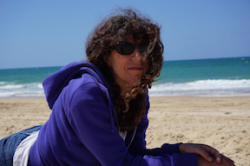Janice Weizman

Janice Weizman is the author of the award-wining historical novel, The Wayward Moon, which tells the story of a young woman on the run in the 9th century Middle East.
Her latest novel Our Little Histories is the multigenerational story of a Jewish family spanning 170 years and three continents.
Her writing has appeared in World Literature Today, Ha'aretz, Lilith, and Queen’s Quarterly, among other venues. She curates the book review website, Reading Jewish Fiction.











